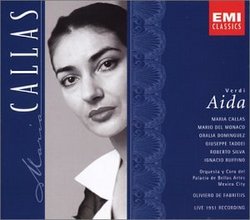| All Artists: Giuseppe Verdi, Oliviero de Fabritiis, Mexico City Orquesta del Palacio de Bellas Artes, Maria Callas, Oralia Dominguez, Mario del Monaco, Roberto Silva, Giuseppe Taddei, Ignacio Ruffino, Carlos Sagarminaga, Rosa Rodriguez Title: Verdi: Aida (complete opera live 1951) with Maria Callas, Mario del Monaco, Oliviero de Fabritis, Orchestra & Chorus of del Palacio de Bellas Artes, Mexico City Members Wishing: 0 Total Copies: 0 Label: EMI Classics Original Release Date: 1/1/1951 Re-Release Date: 11/4/2003 Album Type: Live Genre: Classical Styles: Opera & Classical Vocal, Historical Periods, Modern, 20th, & 21st Century Number of Discs: 2 SwapaCD Credits: 2 UPC: 724356267824 |
Search - Giuseppe Verdi, Oliviero de Fabritiis, Mexico City Orquesta del Palacio de Bellas Artes :: Verdi: Aida (complete opera live 1951) with Maria Callas, Mario del Monaco, Oliviero de Fabritis, Orchestra & Chorus of del Palacio de Bellas Artes, Mexico City
 | Giuseppe Verdi, Oliviero de Fabritiis, Mexico City Orquesta del Palacio de Bellas Artes Verdi: Aida (complete opera live 1951) with Maria Callas, Mario del Monaco, Oliviero de Fabritis, Orchestra & Chorus of del Palacio de Bellas Artes, Mexico City Genre: Classical
|
Larger Image |
CD Details |
CD ReviewsThe most stunning Aida I ever heard Matthew Carey | 05/24/2004 (5 out of 5 stars) "I'm really glad that EMI added even more invaluable Callas-recordings to its catalogue and along with the glorious Norma from Covent Garden this Aida takes the palm. Recorded live in 1951 Callas was in pristine form. Not only the super-human E-flat but also the C, the huge sound in the nile-scene where she and Taddei are singing gloriously. It is so thrilling, it's as if you haven't known Aida all your life and as the drama progresses you're more and more involved. Others have said it far better than I can: Aida in a way it'll never be sung again. Absolutely amazing.P.S. Vocal petroleum? Don't get that, there's nothing dreadful about petroleum per se, it's a source of light. Just like the luminous Callas." "AIDA' THE WAY IT WILL NEVER BE SUNG AGAIN Matthew Carey | 01/19/2004 (5 out of 5 stars) "This live Mexico City performance is still vividly recalled and talked about. In the first legitimate release on CD, one can hear why Maria Callas was Maria Callas. The famous interpolated top E flat at the end of Act II explodes like fireworks ------ and she holds the note for what seems to be forever. But there is a lot more to this fabulous "Aida" than Callas' spectacular top E flat. Her vocal execution of the entire role is on a much higher level than it was to be when she made the EMI studio recording in 1955, with the Nile Scene duet with Amonasro especially searing in intensity. Her Rhadames, none other than the stentorian Mario del Monaco, may bellow a bit, but what a voice he had ---- only Franco Corelli (on HIS studio recording, also for EMI, with Birgit Nilsson, matches it). This is a true warrior. Giuseppe Taddei's sonorous baritone encompasses the role of Amonasro with refinement and conviction (though no one could be faulted for preferring Tito Gobbi on the EMI studio recording with Callas). And ---- in the midst of all these vocal riches, the vastly under-utilized Oralia Dominguez, probably Mexico's greatest mezzo soprano, comes very close to stealing the entire show. If the late great Italian actress Anna Magnani could have sung, this is how she would have sounded. Dominguez doesn't SING her great Judgement Scene ----- she explodes! One can only wish to have been present at this performance. They just don't sing like this anymore. The sound, for what it is, is pretty listenable ---- far more so than is the case with some of the other Callas live issues. Truthfully, I cannot see how anyone would not rank this "Aida" as the most exciting ever preserved in sound. For Callas fans, of course, this set is a must, but also for anyone who really wants to know how "Aida" could sound. Make no mistake - they don't sing ANYWHERE like this anymore! WHOLEHEARTEDLY RECOMMENDED!!!!!!!" All hail to the E Flat Goddess Exequiel Pitargue | 08/23/2005 (5 out of 5 stars) "I have always love Aida I have heard 3 versions but nothing can compare to this. Although the recording quality is terrible, this 1951 gala captures The La Divina in the prime of her vocal prowess. The first time I heard the e flat in the Triumphant schene, my jaw dropped.I could not describe the feeling I had that time. I just closed my eyes and thank the Creator above for giving the world "Maria Callas the greatest suprano in living memory"."
|

 Track Listings (26) - Disc #1
Track Listings (26) - Disc #1